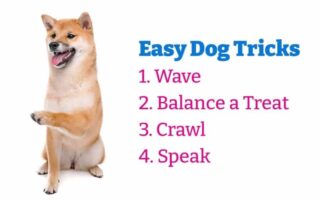When it comes to our furry companions, the bond we share often transcends simple companionship, leading us to explore innovative ways to engage their minds and strengthen our connection. While traditional commands like “sit” and “stay” lay the foundation for good behavior, why not take it a step further? In this article, we delve into a world of unique and fun tricks that will not only impress your friends but will also keep your canine companion entertained and mentally stimulated. From quirky skills that showcase your dog’s personality to interactive challenges that bolster their confidence, these inventive techniques promise to transform your training sessions into a delightful adventure. Join us as we uncover the secrets to teaching your dog some truly unique tricks that will have tails wagging and hearts smiling!
Table of Contents
- Exploring the Foundations of Canine Learning
- Innovative Techniques to Captivate Your Dogs Attention
- The Power of Play: Turning Fun into Training
- Engaging Your Dogs Senses for Enhanced Learning
- Q&A
- Future Outlook
Exploring the Foundations of Canine Learning
Understanding how dogs learn is pivotal in implementing unique training techniques that can enrich your bond with your canine companion. Dogs, like humans, rely on consistency and positive reinforcement as key components in their learning journey. By recognizing the three main types of learning—classical conditioning, operant conditioning, and observational learning—you can tailor your training methods to best suit your dog’s personality. This exploration into canine learning allows for the development of innovative tricks that engage your dog mentally and often result in delightful surprises for both of you.
When it comes to bewitching behaviors to teach your furry friend, consider instituting a few less conventional tricks. Here’s a brief list to get your creative juices flowing:
- Backwards Walking: Teach your dog to walk backwards on command for a fun twist.
- Play Dead: Add realism to this classic trick by associating it with a specific sound.
- Fetch Specific Items: Train your dog to retrieve specific toys or objects by name.
- Clean Up Toys: Instill a sense of responsibility and organization through play.
| Trick | Benefits | Training Tip |
|---|---|---|
| Backwards Walking | Enhances coordination | Use a treat to guide them |
| Play Dead | Encourages drama! | Associate with “bang” gesture |
| Fetch Specific Items | Mental stimulation | Name each item repeatedly |
| Clean Up Toys | Promotes tidiness | Reward them for every item |
Innovative Techniques to Captivate Your Dogs Attention
One of the most effective ways to engage your dog is through sensory stimulation. Utilize various textures, sounds, and visual aids to pique their curiosity. Incorporate items like crinkly toys, bells, or shiny ribbons to create a multi-sensory experience that captures their attention. Try the following methods:
- Use a feather or a laser pointer to encourage chasing.
- Introduce scent work with hidden treats using different scents.
- Create obstacle courses with different surfaces for them to explore.
Another innovative approach is to integrate technology into training sessions. Smart dog toys or apps designed for interactive play can transform your dog’s learning atmosphere. For instance, using an automated treat dispenser or a video call app can make training feel like a game. Here’s a quick comparison of some technological tools that can enhance your sessions:
| Tool | Features | Benefits |
|---|---|---|
| Smart Ball | Remote control, noise-making | Encourages active play, stimulates chasing instincts |
| Interactive App | Training games, virtual rewards | Enhances focus, builds positive reinforcement |
| Automated Treat Dispenser | Remote operation, customizable settings | Encourages longer attention spans, rewarding good behavior |
The Power of Play: Turning Fun into Training
Turning training sessions into enjoyable playtime can significantly enhance your dog’s learning experience. When you infuse play into training, you create a positive association that encourages your dog to engage willingly. One effective method is to utilize toys as rewards. For example, during training, use a favorite toy to grab their attention and reward them with playtime when they successfully complete a command. This method not only reinforces their learning but also makes the process enjoyable for both of you. Consider integrating activities like hide-and-seek, where you can hide treats or toys around the house and let your dog find them, turning a simple search into an exciting game.
Exploring unique tricks can also add variety to your training sessions. Here are some creative tricks to consider:
- Spin: Teach your dog to spin in circles on command.
- Bow: Train your dog to lower their front legs while keeping the back legs standing.
- Roll Over: Encourage your dog to roll over on their back for a treat.
- Crawl: Teach your dog to crawl under your legs or along the ground.
| Trick | Training Method |
|---|---|
| Spin | Use a treat to guide your dog in a circle. |
| Bow | Encourage with treats while demonstrating. |
| Roll Over | Guide them with a treat and reward when they complete. |
| Crawl | Have them lay down and encourage movement with treats. |
By making learning playful, you’ll not only build a stronger bond with your dog but also foster their confidence and enthusiasm towards training. Each success, rewarded through play, builds on their skills and keeps their interest piqued, guaranteeing that both of you enjoy the journey of learning together.
Engaging Your Dogs Senses for Enhanced Learning
Engaging your dog’s senses can turn the learning process into an exciting and rewarding experience. Each sense plays a crucial role in how your dog perceives the world and learns new tricks. By stimulating their sight, smell, and hearing, you can create an environment rich in sensory experiences that enhances their ability to absorb information. Here are several methods to invigorate your dog’s senses during training:
- Visual Stimulation: Use bright, contrasting colors for training toys or treats. Consider incorporating hand signals along with verbal commands to engage their sight.
- Scent Exploration: Introduce different smells by hiding treats or toys around your home or yard. This encourages your dog to use their nose, which is one of their most powerful senses.
- Auditory Cues: Utilize unique sounds or music during training sessions. Experimenting with different tones can help associate commands with specific cues.
The table below summarizes the key senses to engage and how to do so effectively:
| Sense | Method |
|---|---|
| Sight | Use colorful toys and visual cues. |
| Smell | Hide treats for scent-based games. |
| Hearing | Incorporate unique sounds and commands. |
By focusing on these sensory elements, you can craft a multifaceted training experience that not only enhances your dog’s learning but also strengthens the bond between you two. As your dog begins to master unique tricks, they’ll have a fun approach to learning that keeps them engaged and happy!
Q&A
Q&A: Unique Tricks to Teach Your Dog
Q1: What are some unique tricks I can teach my dog beyond the basics?
A1: Think outside the box! You can teach your dog to play dead, roll over, or even fetch specific items by name. More unique options include “put your toys away,” where your dog learns to clean up after playtime, or “dancing,” where they can stand on their hind legs and spin around. There’s also the charming skill of “speaking,” or barking on command, which can be useful for tricks or just to show off!
Q2: How do I get started with teaching these unique tricks?
A2: Begin with positive reinforcement. Use treats, praise, or favorite toys as motivators. Start in a quiet environment with minimal distractions, and break each trick down into smaller steps. For example, if you want to teach your dog to “dance,” start with getting them comfortable standing on their hind legs and gradually add the spin motion. Consistency and patience are key!
Q3: What if my dog struggles to learn a trick?
A3: Each dog learns at their own pace. If they’re not picking it up, try adjusting your approach. Shorter training sessions can help maintain their interest. Additionally, consider if the trick may be too complex; try breaking it down further or switching to a simpler trick they’re more likely to succeed at first. Frustration is counterproductive—keep it fun!
Q4: Are there tricks that are especially good for specific breeds?
A4: Absolutely! Some breeds have natural tendencies or physical abilities that lend themselves to particular tricks. For example, Herding breeds like Border Collies excel at agility and can learn advanced tricks like weaving between cones. Meanwhile, small breeds such as Chihuahuas can enjoy tricks that leverage their size, like “fit into a bag.” Consider your dog’s energy level, intelligence, and physical traits when choosing tricks.
Q5: How can I incorporate these tricks into daily life?
A5: Integrating tricks into your daily routine can enhance your dog’s skills and provide mental stimulation. Use “put your toys away” after playtime, or ask them to “dance” for treats at mealtime. These small, regular practices can reinforce learning and make everyday moments more engaging for both of you!
Q6: Can I teach my dog tricks virtually?
A6: Yes! Many trainers offer online classes focused on teaching dogs tricks. Make sure to choose reputable sources and check for any virtual events held at local pet stores or community centers. Online videos can also be a fantastic resource—tutorials often break down tricks step by step, allowing you to learn alongside your dog.
Q7: Do teaching tricks have any benefits for my dog’s overall behavior?
A7: Teaching tricks not only stimulates your dog mentally, but it also improves your bond with them. Engaging in training sessions can reduce behavioral problems stemming from boredom and excess energy. A well-trained dog is often more confident and responsive, leading to an overall happier and healthier pet! Plus, the joy of seeing your dog succeed brings a sense of accomplishment for both of you.
Whether you’re exploring new avenues or reinforcing established ones, the world of trick training offers endless opportunities for growth and fun!
Future Outlook
teaching your dog unique tricks not only enhances their skill set but also strengthens the bond you share. As you embark on this playful journey together, remember that patience, consistency, and plenty of love are key ingredients to success. Whether it’s the whimsical spin, the impressive bow, or the charming high-five, each new trick adds a dash of variety and excitement to your daily routine. So grab those treats, unleash your creativity, and watch as your furry companion delights you with their newfound talents. After all, in the world of dog training, there’s no limit to the fun you can have together! Happy training!



